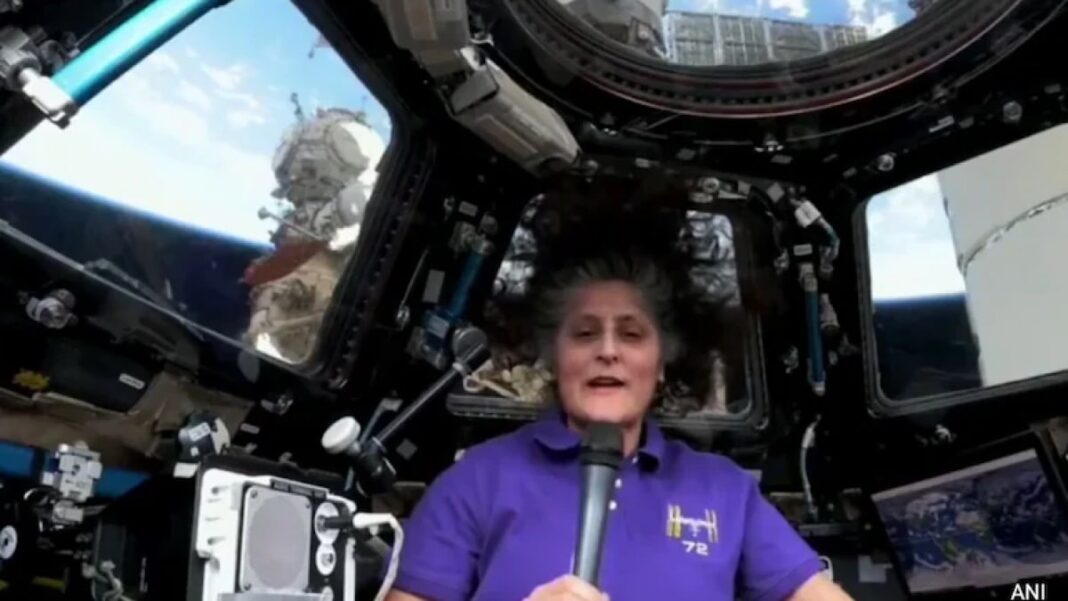NASA Astronaut Conducts Agricultural Experiment in Space
NASA astronaut Sunita Williams is currently conducting a groundbreaking agricultural experiment aboard the International Space Station (ISS) aimed at advancing space farming techniques and addressing Earth’s agricultural challenges. The experiment, part of NASA’s Plant Habitat-07 study, involves cultivating “Outredgeous” romaine lettuce in microgravity conditions to explore the impact of water availability on plant growth in space.
Objectives of the Experiment
The primary goal of this research is to develop effective plant cultivation methods for extended space missions. Scientists are studying how plants grow in microgravity to support self-sustaining life-support systems in space. These findings are expected to aid in designing water-efficient agricultural practices for drought-stricken regions on Earth.
Sunita Williams has been actively involved in collecting baseline water samples and installing the science carrier for the lettuce, serving as its cultivation chamber. Data from this experiment will provide valuable insights into growth patterns, nutritional content, and the overall health of the lettuce.
Implications for Space and Earth
The ability to grow food in space is crucial for reducing dependence on resupply missions and providing astronauts with fresh, nutritious produce, offering psychological benefits during prolonged space travel. On Earth, the findings from this experiment may inform sustainable farming practices, allowing crops to be cultivated using minimal resources.
The ISS’s Advanced Plant Habitat, utilized for this study, provides cutting-edge infrastructure for agricultural research. The insights gained could contribute to solutions for global food security and resource conservation.
Conclusion
In conclusion, NASA’s agricultural experiment aboard the ISS holds immense promise for advancing space farming techniques and addressing Earth’s agricultural challenges. The findings from this study have the potential to revolutionize plant cultivation methods both in space and on our planet, offering solutions for sustainable farming practices and global food security.
FAQs
1. What is the primary goal of the Plant Habitat-07 study?
The primary goal of the Plant Habitat-07 study is to develop effective plant cultivation methods for extended space missions.
2. How is Sunita Williams involved in the experiment?
Sunita Williams is collecting baseline water samples and installing the science carrier for the lettuce, serving as its cultivation chamber.
3. What are the implications of growing food in space?
Growing food in space reduces dependence on resupply missions, provides astronauts with fresh produce, and offers psychological benefits during prolonged space travel.
4. How can the findings from this experiment benefit Earth?
The findings from this experiment may inform sustainable farming practices on Earth, allowing crops to be cultivated using minimal resources.
5. What infrastructure is used for the study?
The ISS’s Advanced Plant Habitat provides cutting-edge infrastructure for the agricultural research being conducted.
6. How can this experiment contribute to global food security?
Insights gained from this experiment could contribute to solutions for global food security and resource conservation.
7. Why is studying plant growth in microgravity important?
Studying plant growth in microgravity is crucial for developing self-sustaining life-support systems in space.
8. What data is being collected in the experiment?
Data collected in the experiment includes growth patterns, nutritional content, and the overall health of the lettuce being cultivated.
9. How can this research aid in designing water-efficient agricultural practices?
The research aims to understand how water availability impacts plant growth, which can help design water-efficient agricultural practices for both space missions and Earth.
10. What are the potential benefits of this experiment for sustainable farming?
The potential benefits include informing sustainable farming practices, allowing crops to be cultivated using minimal resources, and addressing food security challenges.
Tags
Tags: NASA, Space Farming, Agricultural Experiment, Plant Habitat-07, Sunita Williams, International Space Station

